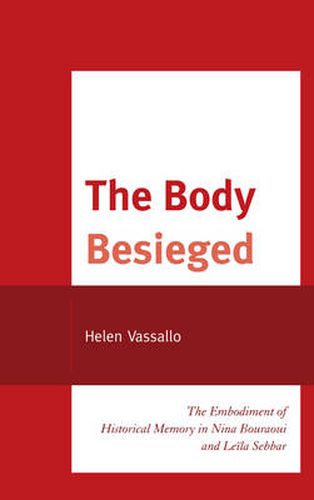Readings Newsletter
Become a Readings Member to make your shopping experience even easier.
Sign in or sign up for free!
You’re not far away from qualifying for FREE standard shipping within Australia
You’ve qualified for FREE standard shipping within Australia
The cart is loading…






The Body Beseiged: The Embodiment of Historical Memory in Nina Bouraoui and Leila Sebbar by Helen Vassallo brings together the work of two important contemporary writers, Nina Bouraoui and Leila Sebbar. Both authors embody a significant historical divide (they are half French and half Algerian), and each author’s work returns unfailingly to the legacy of opposition engendered by the colonial past that France and Algeria share: neither Bouraoui nor Sebbar claims any intention to write about the Algerian War of Independence, and yet its impact is felt throughout all of the texts chosen for discussion. This inescapable omnipresence of the Algerian War is conceptualized here as embodied memory, a corporeal impulse to write about a war whose legacy is transmitted to these second-generation writers rather than a conscious decision to engage with the historical aspect of their personal heritage. Both authors suffer a culturally imposed de-territorialization in their life and their early autobiographical narratives, and both subsequently undergo a voluntary displacement, undertaking literal and psychological journeys to map out routes towards a sense of self, of belonging, and ultimately of re-territorialization. However, the analysis reveals how this move from de-territorialization to re-territorialization is accompanied by a shift from internalization (through memory and silence) to externalization (via articulation and community): rather than using the individual as symbolic of the universal, Bouraoui’s and Sebbar’s life writing acknowledges that their experience begins with a universal, historical, or social context, and represents a personal act of remembrance which is key to the recovery of historical memory, and to the negotiation of an appropriate space for this memory. At a time of reconciliation and remembrance, the analysis exposes and probes open wounds in the Franco-Algerian relationship through a close focus on the autobiographical writings of two authors who embody both (hi)stories, and whose texts represent a site of this embodied memory.
$9.00 standard shipping within Australia
FREE standard shipping within Australia for orders over $100.00
Express & International shipping calculated at checkout
The Body Beseiged: The Embodiment of Historical Memory in Nina Bouraoui and Leila Sebbar by Helen Vassallo brings together the work of two important contemporary writers, Nina Bouraoui and Leila Sebbar. Both authors embody a significant historical divide (they are half French and half Algerian), and each author’s work returns unfailingly to the legacy of opposition engendered by the colonial past that France and Algeria share: neither Bouraoui nor Sebbar claims any intention to write about the Algerian War of Independence, and yet its impact is felt throughout all of the texts chosen for discussion. This inescapable omnipresence of the Algerian War is conceptualized here as embodied memory, a corporeal impulse to write about a war whose legacy is transmitted to these second-generation writers rather than a conscious decision to engage with the historical aspect of their personal heritage. Both authors suffer a culturally imposed de-territorialization in their life and their early autobiographical narratives, and both subsequently undergo a voluntary displacement, undertaking literal and psychological journeys to map out routes towards a sense of self, of belonging, and ultimately of re-territorialization. However, the analysis reveals how this move from de-territorialization to re-territorialization is accompanied by a shift from internalization (through memory and silence) to externalization (via articulation and community): rather than using the individual as symbolic of the universal, Bouraoui’s and Sebbar’s life writing acknowledges that their experience begins with a universal, historical, or social context, and represents a personal act of remembrance which is key to the recovery of historical memory, and to the negotiation of an appropriate space for this memory. At a time of reconciliation and remembrance, the analysis exposes and probes open wounds in the Franco-Algerian relationship through a close focus on the autobiographical writings of two authors who embody both (hi)stories, and whose texts represent a site of this embodied memory.